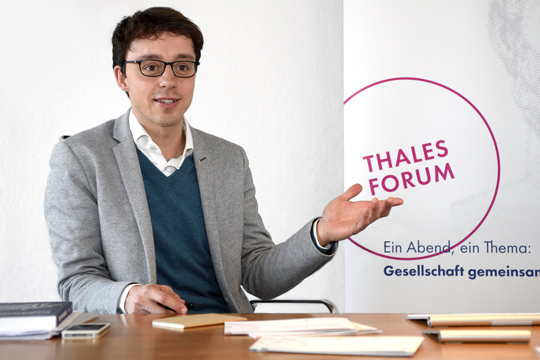Mechanization and dignity
Freiburg, Feb 21, 2019
Medicine can do a lot today - keyword “CRISPR/Cas9”: This is the name of the gene scissors recently used by a researcher from China to genetically modify two human embryos. But are designer babies ethically justifiable or desirable? The discipline of medical ethics, still itself in an embryonic stage, is dedicated not only to questions such as these, but also to topics such as the dignity and self-determination of patients. The Thales Academy, the University of Freiburg and the Furtwangen University will be offering a new further training course starting in April 2019. Hans-Dieter Fronz spoke with Dr. Philippe Merz, head of the training program.

The Hippocratic oath is regarded as the basis for all ethical actions by physicians - but how do changes in the health care system affect their professional self-image? Photo: BillionPhotos.com/stock.adobe.com
Mr. Merz, what is medical ethics all about?
Philippe Merz: The classical spectrum of topics includes conflicts that arise between the patient’s will, the doctor’s self-image and family wishes, such as assisted suicide, abortion or the possibilities of reproductive medicine. Today, however, we are increasingly challenged by ethical conflicts in the distribution of funds in the health care system and in the mechanization of the healing profession.
Why are you offering a seminar on this topic right now? Has the need for medical-ethical orientation increased?
Yes, that’s what we are seeing. There are three main reasons for offering such continuing education. Firstly, our society has become more and more pluralized in terms of ideology, so that there are more and more opposing ideas about which medical interventions in life are ethically justifiable. Secondly, healthcare has become increasingly technological and, above all, digital in recent years. Big data, for example, is a huge topic here: Who is allowed to receive sensitive patient data, and what applications and business models are already possible today? The third reason is that the healthcare system has changed in such a way that the operation of clinics in particular is potentially very profitable. This has not only changed the incentive structures, but also the doctor-patient relationship and the relationship between doctors and hospital management. Doctors and nursing staff increasingly feel challenged in their professional self-image.
What goals are you trying to achieve with your program?
On the one hand, we would like to deepen the philosophical and medical-ethical expertise of the participants by illuminating the background of certain concepts that guide our daily actions in the health care system - i.e. self-determination and patient autonomy, justice, dying with dignity or “performance”, for example in view of the increasing possibilities for enhancement. On the other hand, we want to teach people methods of decision-making in ethical conflicts in everyday life. In addition, we want to enable the participants to exchange experiences across different professions in order to counteract the increasing potential for working in a bubble. This is why we deliberately target doctors, but also nurses, hospital managers, pharmacists and people from medical technology and healthcare companies.

Philippe Merz from the Thales Academy will lead the introductory seminar on various ethical argumentation strategies. Photo: Thomas Kunz
What does the continuing education look like in concrete terms?
In the seminars, the teachers combine keynote speeches with plenary discussions, case studies and role playing. These are therefore different didactic formats, also to convey the topics in a lively, everyday way. We have been able to attract proven experts from Germany and Switzerland, some of whom are also members of the German or Swiss Ethics Council.
Which topics are addressed?
The introduction will focus on the philosophical foundations of medical ethics. The following seminars will deal with the increasing mechanization and economization, which create an uncanny dynamic. And then these basic seminars are applied to different phases of life in which concrete ethical conflicts can arise - to the beginning, the course and the end of life. The topic of the eighth and final seminar will be methods of ethical decision-making and conflict resolution.
And what is your subject?
I am leading the introductory seminar on different ethical argumentation strategies. I would like to create an awareness of the extent to which our ethical convictions shape our identity and thus also our professional self-image and our daily actions.
Starting in April 2019
The part-time further education in medical ethics is a joint offer of the Thales Academy for Economics and Philosophy, the University of Freiburg and Furtwangen University and concludes with an internationally recognized Certificate of Advanced Studies (CAS). Interested parties can register until March 1, 2019. The offer was distinguished with the Continuing Education Development Award 2017 - CEDA for short. The prize is awarded by the cooperation project “Weiter in Südbaden”. Eight universities from the Upper Rhine/Black Forest region are involved in the project, which is led by the University of Freiburg and Furtwangen University.
For more information about the continuing education program

